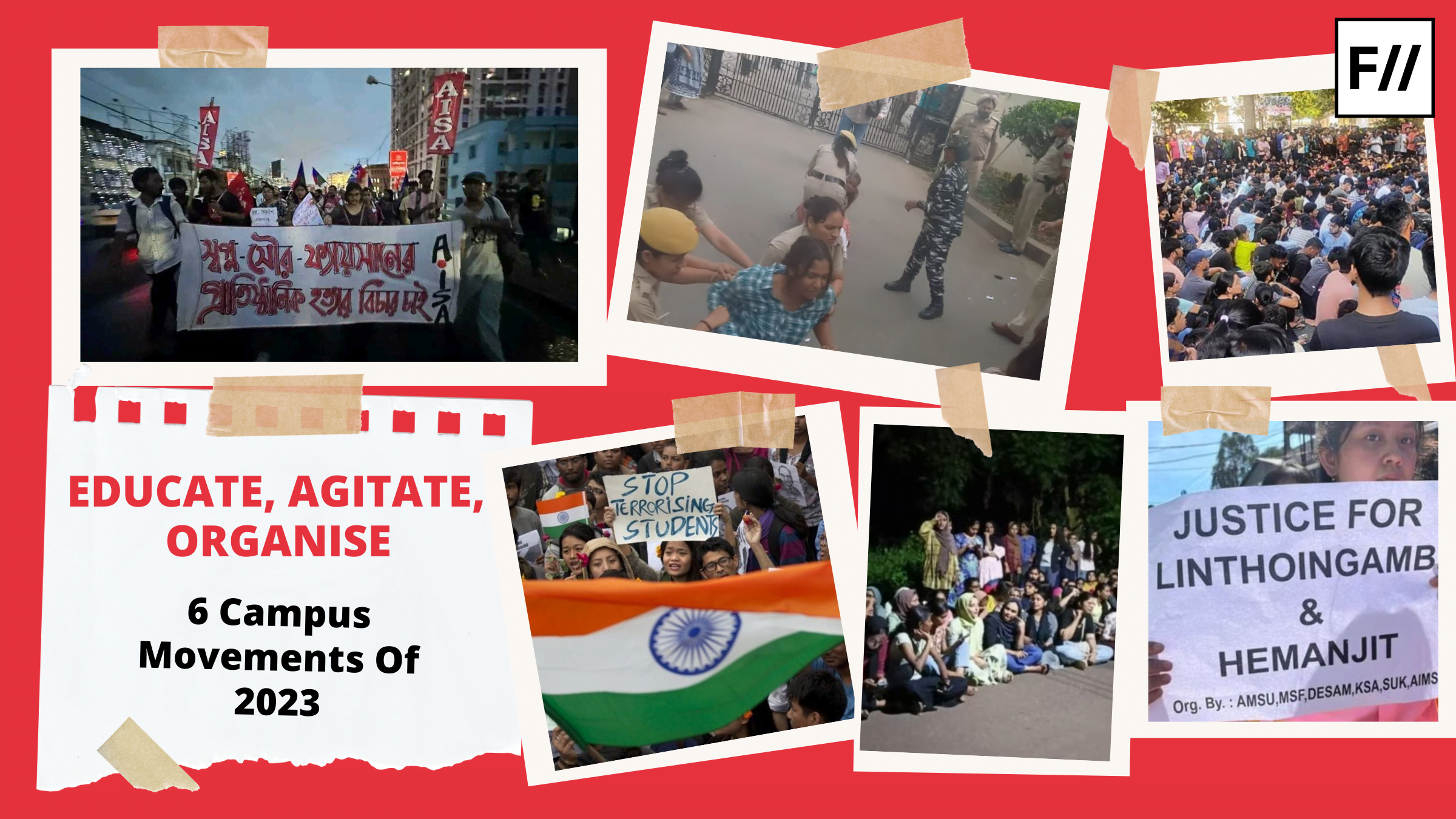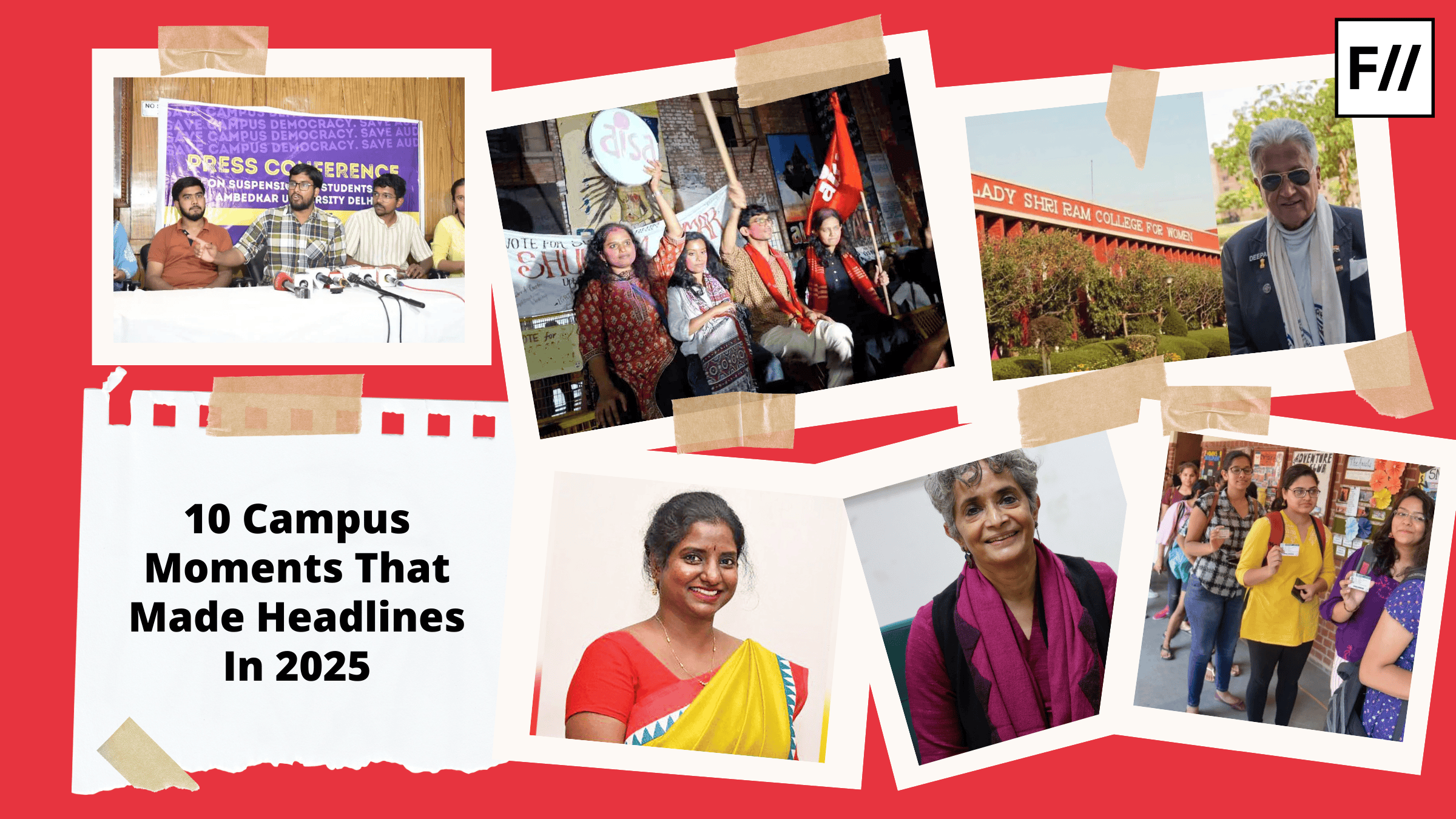2023 has been a year of student movements on academic campuses in India. The nexus between academia and activism has been upheld yet again as student-led protest movements gained momentum in Indian University spaces.
From protests against the stifling of academic freedom and censorship to movements against sexual harassment, transphobia and ragging, 2023 has seen several campus movements including protests even by young school students. Let us take a look at some of the most impactful student protests in India in the year 2023.
1. Faculty protests at Ashoka University
In recent years, academic freedom has often come under strict scrutiny by the ruling government. The liberty to research, learn and teach is conditional and often restricted in present-day India. In July-August, 2023, an economics professor at Ashoka University in Sonepat, Haryana, whose research paper titled ‘Democratic Backsliding in the World’s Largest Democracy,’ on the 2019 Lok Sabha elections had come under fire, voluntarily resigned.
Following his resignation, the university said it was “dismayed” by the discussions on Professor, Sabyasachi Das’s research paper and that while faculty are encouraged to carry out research, the University does not “direct or approve specific research projects by individual faculty members.”
Following this, Prof. Das sent in his resignation which was promptly accepted by the University. In a show of mass outrage, several of his colleagues threatened a “faculty exodus,” saying in a letter to the governing body that they would not continue taking classes until and unless “questions regarding basic academic freedoms are resolved before the start of the Monsoon 2023 semester.”
Following this, several professors from Institutes across the country sent in mass resignation letters. The call for academic freedom was loud and clear and the solidarity shown in the teaching community was unprecedented.
2. Student protests at IIT-BHU
On 1st November, a female student of IIT-BHU was molested, forcibly kissed and disrobed on camera on campus by three unidentified men on a bike. Following this, hundreds of students gathered in protest at the institute director’s office demanding better security on campus.
In her police complaint, the survivor stated, “I am a resident of a hostel at IIT-BHU. On November 2, around 1.30 am, I left my hostel for a walk. I met a male friend… We were walking together when… a motorcycle with three men approached us from behind. They parked their motorcycle there and separated my friend and me. They shut my mouth tightly and took me to a corner, kissed me forcibly, took off my clothes and recorded photos and videos. When I shouted for help, they threatened to kill me. They let me go after 10-15 minutes. When I ran towards my hostel, I heard the sound of the motorcycle. Then, I hid at the residence of a professor, who took me to the security officials.”
In their statement, the Students’ Parliament of IIT-BHU said that in light of the events, they were “launching an institute-wide protest…boycotting all academic activities and holding a sit-in protest at DG Corner and the Director’s Office from 10 am on November 2.”
“This is a heinous crime that has shaken the very fibre of our institution. It is not the first time such an incident has occurred on campus. Students have repeatedly raised concerns about security on campus, but the administration has failed to take adequate action,” they added.
The student body called for “night barricading to restrict the entry of outsider vehicles inside the campus with a single point entry/exit, centralised CCTV system, and legal action on violent offenders.”
The protest was called off the same night after reassurance from the authorities, who promised to take steps towards campus safety, including approving a plan to create a green corridor where IIT students can move around and deciding to install barricades and check ID cards.
3. Protest by SFI DU at IPCW
On March 28th, at the Indraprastha College For Women (IPCW) Fest, several men who were outsiders scaled walls to barge into the college harassed women students and hurled vulgar and sexist slurs towards them. Following this, the Students Federation of India at DU called for a peaceful protest outside the gate of IPCW in solidarity with the protest happening inside the campus.
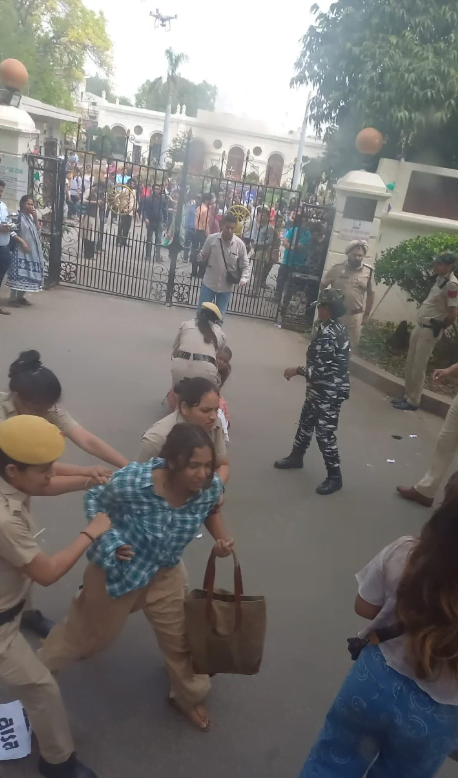
“Despite the distressing incident, the principal hasn’t addressed the matter. However, this is not an isolated incident, as similar incidents have occurred at Miranda House and several other women’s colleges. The authorities’ silence is aiding these men to carry on with such incidents. It is high time that strict action is taken against such acts of harassment,” a student said.
An SFI representative, who participated in the protest, said, “Heavy police deployment at IPCW compelled us to move the protest to the Arts Faculty at Delhi University. Even at the Arts Faculty, heavy police deployment to curb students’ voices was witnessed. Several SFI activists and other students demanding justice for the women students who were subjected to harassment have been detained by the authorities during a peaceful protest at Arts Faculty, Delhi University. We have been demanding immediate action from the authorities and are asking for the safety and security of women students.”
4. Protest by school students in Manipur
In July, two young students from Manipur went missing. The news went viral on social media in September, which led to protests by school students.
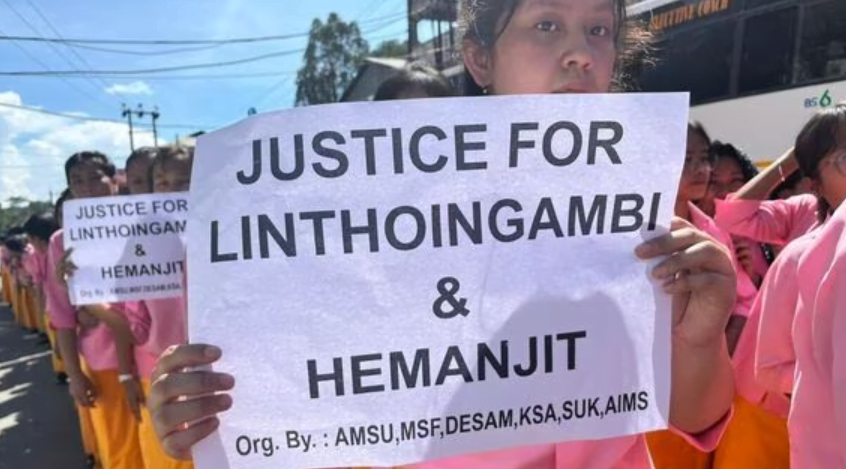
“We demand that the killers of the two students be arrested within 24 hours and their bodies be recovered for their last rites. We also want to meet the Chief Minister to address our grievances. How can we continue with our studies when our friends and classmates are being murdered in cold blood,” said Lanthengba, a student leader leading the rally, according to PTI.
Sloganeering for Justice, the students were marching towards Manipur CM Biren N Singh’s house. When a few of the protesters began pelting stones against the security forces, the latter fired several rounds of tear gas shells to disperse the mob at Moirangkhom in Imphal. The violence occurred around 200 metres away from the CM’s secretariat.
5. Protests at JU campus following homophobic ragging
On August 9, a first-year student of Bengali at Kolkata’s premiere Jadavpur University died by suicide by jumping from the balcony of the Jadavpur University Main Hostel. His death was a case of ragging, an issue which is rampant in Indian universities, especially all-male hostels.
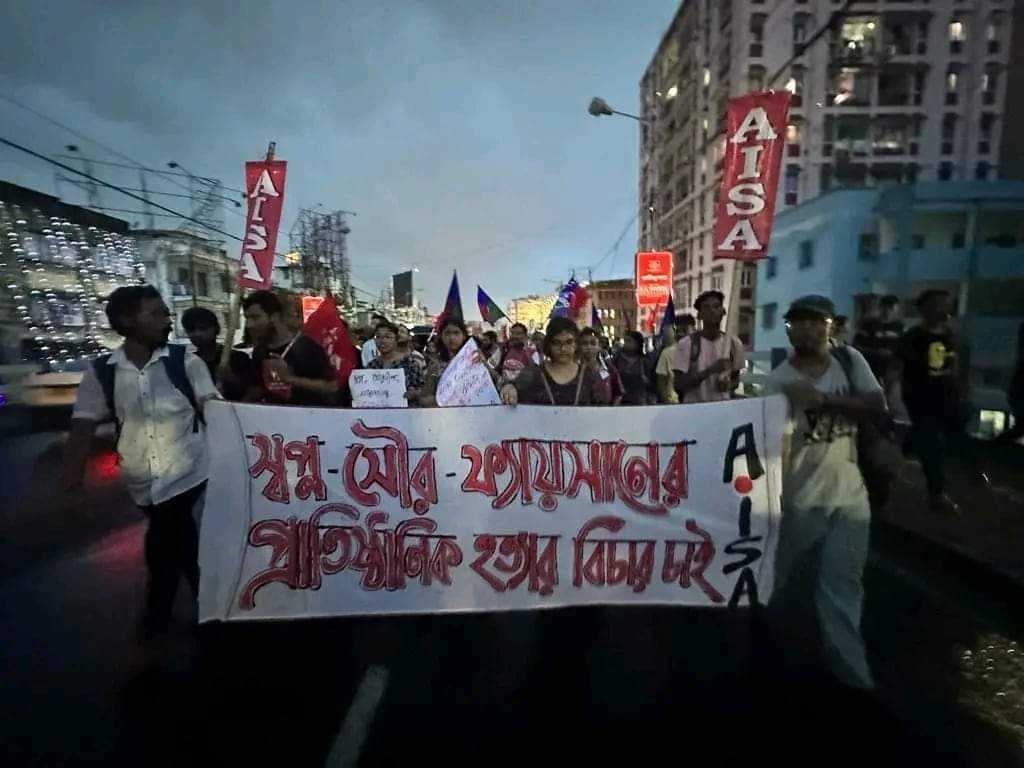
It appears, after further investigation, that the student, who was barely eighteen, was a victim of vicious homophobic ragging by hostel seniors who made assumptions about his sexual orientation, owing to his bodily traits.
Following this vicious case of ragging, several students of Jadavpur University started almost a month-long sit-in protest at the University’s Administrative block, Aurobindo Bhavan and led several protest rallies condemning ragging and demanding punitive measures against the perpetrators.
On 17th August, while protesting the ragging case and the ensuing vilification of JU by the popular media, a trans student named Urmi was brutally beaten up by goons who came to JU to incite violence after the ragging case. When Urmi’s friends attempted to seek justice for her at the Jadavpur Police Station, they faced transphobic ridicule and jeers from the police.
The very next day, the Students of Jadavpur University organised a protest rally at the Jadavpur Police Station condemning the transphobic attack, the culture of ragging and the constant harassment faced by JU students after the incident. The students were joined by trans activists who submitted a deputation to the Jadavpur Police Station.
However, little media coverage of student protests at JU following the ragging case points to a case of selective journalism and vilification.
6. Protest screenings after ban on Gay India Matrimony
On March 2nd, 2023, students of a right-wing group called “Hari Om” protested against and stopped the screening of Debalina Majumdar’s film Gay India Matrimony at the Ravenshaw College Film Festival in Cuttack. The reason cited for banning the film was it was deemed as “an attempt to corrupt the minds of youth.”
A protest screening of the film was also cancelled by the Scottish Church College in Kolkata. The institution cited several vague reasons for the cancellation (which was termed ‘postponement’) including an email by two students and resistance by the Church of North India.
On 20th March 2023, following the cancellation of Debalina Majumdar’s “Gay India Matrimony,” from screening at the Ravenshaw College Film Festival in Cuttack, Art Against Oppression, a student-led organisation that engages in the cultures of protest organised an open screening of the film in JU’s Worldview.
On the day of the screening, the scholar spoke at the event, solidifying mutual solidarities and exemplifying the connection between art and lived experiences.
Similar protest screenings took place at TISS and SRFTI. In light of the marriage equality verdict by the Supreme Court of India, films like Majumdar’s “Gay India Matrimony,” become extremely important, especially to initiate conversations in campus spaces.
Disclaimer: This is by no means an exhaustive or representative list. Suggestions to add to the list are welcome in the comments section.
About the author(s)
Ananya Ray has completed her Masters in English from Jadavpur University, Kolkata, India. A published poet, intersectional activist and academic author, she has a keen interest in gender, politics and Postcolonialism.
